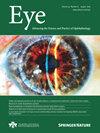青光眼人工晶体植入术,我们的报告做得好吗?DECIDE-AI 检查表依从性系统文献综述。
IF 2.8
3区 医学
Q1 OPHTHALMOLOGY
引用次数: 0
摘要
背景/目的:本系统文献综述探讨了人工智能(AI)决策支持系统(DSS)在青光眼治疗中的早期临床评估质量。人工智能在青光眼护理中的应用在文献中越来越多。对于这样的决策支持系统,需要有标准化的报告,以便更快地进行临床适应。2022年5月,赤道网络发布并通过了一份促进早期人工智能研究报告的清单(DECIDE-AI)。方法:检索Cochrane图书馆、Embase、Ovid MEDLINE、PubMed、SCOPUS和Web of Science核心合集,检索2020年1月至2023年5月期间发表的报告DSS用于青光眼诊断或识别人工智能驱动的青光眼进展的临床评价的研究。遵循PRISMA指南(PROSPERO注册:CRD42023431343)。提取研究细节并对照DECIDE-AI检查表进行审查。生成AI-Specific Score、Generic-Item Score和DECIDE-AI Score。结果:共筛选了1552条记录,其中19项研究纳入了本综述。所有研究都讨论了人工智能在青光眼治疗中的早期临床评估,这是由先验研究方案定义的。总体而言,DECIDE-AI依从性评分较低,作者未报告AI特定项目(30.3%),而遵守通用报告项目(84.7%)。结论:总体而言,人工智能研究重要方面的报告不够理想。鼓励编辑和作者纳入清单将加强标准化报告,加强将人工智能决策支持系统纳入青光眼护理工作流程的证据基础,从而有助于改善患者护理和结果。本文章由计算机程序翻译,如有差异,请以英文原文为准。

AI for glaucoma, Are we reporting well? a systematic literature review of DECIDE-AI checklist adherence
This systematic literature review examines the quality of early clinical evaluation of artificial intelligence (AI) decision support systems (DSS) reported in glaucoma care. Artificial Intelligence applications within glaucoma care are increasing within the literature. For such DSS, there needs to be standardised reporting to enable faster clinical adaptation. In May 2022, a checklist to facilitate reporting of early AI studies (DECIDE-AI) was published and adopted by the EQUATOR network. The Cochrane Library, Embase, Ovid MEDLINE, PubMed, SCOPUS, and Web of Science Core Collection were searched for studies published between January 2020 and May 2023 that reported clinical evaluation of DSS for the diagnosis of glaucoma or for identifying the progression of glaucoma driven by AI. PRISMA guidelines were followed (PROSPERO registration: CRD42023431343). Study details were extracted and were reviewed against the DECIDE-AI checklist. The AI-Specific Score, Generic-Item Score, and DECIDE-AI Score were generated. A total of 1,552 records were screened, with 19 studies included within the review. All studies discussed an early clinical evaluation of AI use within glaucoma care, as defined by the a priori study protocol. Overall, the DECIDE-AI adherence score was low, with authors under reporting the AI specific items (30.3%), whilst adhering well to the generic reporting items (84.7%). Overall, reporting of important aspects of AI studies was suboptimal. Encouraging editors and authors to incorporate the checklist will enhance standardised reporting, bolstering the evidence base for integrating AI DSS into glaucoma care workflows, thus help improving patient care and outcomes.
求助全文
通过发布文献求助,成功后即可免费获取论文全文。
去求助
来源期刊

Eye
医学-眼科学
CiteScore
6.40
自引率
5.10%
发文量
481
审稿时长
3-6 weeks
期刊介绍:
Eye seeks to provide the international practising ophthalmologist with high quality articles, of academic rigour, on the latest global clinical and laboratory based research. Its core aim is to advance the science and practice of ophthalmology with the latest clinical- and scientific-based research. Whilst principally aimed at the practising clinician, the journal contains material of interest to a wider readership including optometrists, orthoptists, other health care professionals and research workers in all aspects of the field of visual science worldwide. Eye is the official journal of The Royal College of Ophthalmologists.
Eye encourages the submission of original articles covering all aspects of ophthalmology including: external eye disease; oculo-plastic surgery; orbital and lacrimal disease; ocular surface and corneal disorders; paediatric ophthalmology and strabismus; glaucoma; medical and surgical retina; neuro-ophthalmology; cataract and refractive surgery; ocular oncology; ophthalmic pathology; ophthalmic genetics.
 求助内容:
求助内容: 应助结果提醒方式:
应助结果提醒方式:


